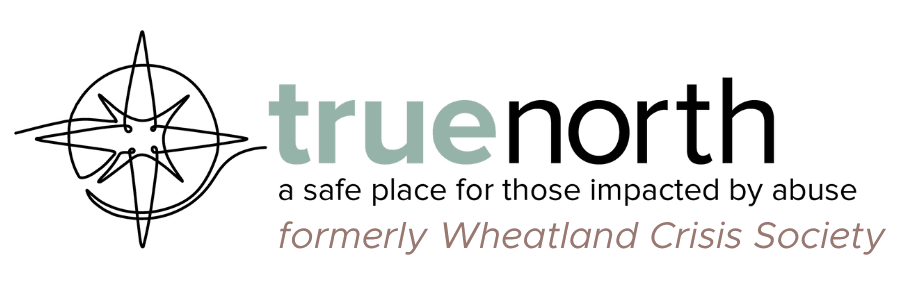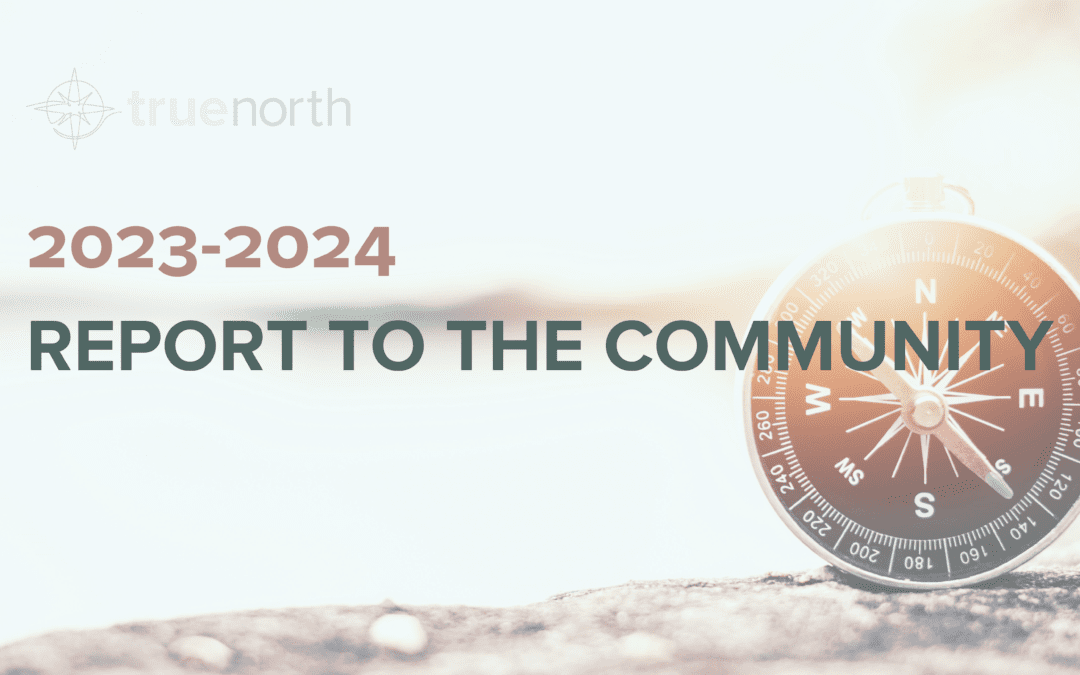Thank you all who attended True North’s 2023-2024 Annual General Meeting on June 26, 2024, and helped to celebrate this year’s success together!
We have had a fantastic year of change, development, and growth as we work together to make our programming more efficient, respond to regional trends and community needs, and work continuously in our efforts to help create a future where all are free from violence.
Below, you can view the Report to the Community section of the AGM, with speaking notes attached.
Please reach out if you have any questions about the Annual General Meeting or the Report to the Community by contacting True North at general@truenorthab.com.
True North Society: Report to the Community 2023-2024

Executive Director Message
Hello everyone. My name is Courtney Helfrich, and I am the incoming Executive Director with True North Society.
Although I am new to the role, I have been with the agency for 8 years total, filling various different roles along the way. It is my pleasure to provide thoughts on the past year as the leader of True North Society. It is a privilege to work for such a value driven organization. As always, we put the needs of the people we serve at the forefront, understanding that each person and family is unique, and our team works hard to provide client-centered and trauma-informed care.
Domestic violence can happen to everyone. It does not discriminate. We recognize this and believe wholeheartedly that everyone deserves a space to be free of violence. Our goal is to change the world a little bit at a time. We are hopeful that there could be a day where violence impacts no one. We are looking forward to a year of focusing on early intervention, outreach and prevention services. We hope to prevent violence before it even begins. This all starts with our children and the little people of the world. If we can ensure that they have the tools and supports needed to help with emotional regulation, connection and access to high-quality resources to improve health and overall well-being, we truly believe this will in turn translate to a safer world for the future.
Now I will take us through some exciting accomplishments from this year!
People
- There has been a lot of change within the agency over the last year. With two executive directors, and many new positions, we are very much looking forward to working with our staff to continue to offer stability and foster a place of belonging where all voices are heard. This is so important to us.
- We received a few new grants this year that we applied for separate from our core funding. We welcome a new Indigenous Community Resource Support Worker and a Family Counsellor. We still have not received an increase in our core funding since 2014-2015. However, we had a meeting with the Ministry of our sector and had the opportunity to further share what we are seeing and experiencing. We are hopeful this will transition into more funding.
- Our Workplace Health and Safety committee was extremely active this year working to keep us safe! We updated all of our policy manuals, but specifically paid special care to our health and safety manual. It is very important to us that our staff are safe.
- Our staff no longer work alone overnight. We know there is risk in this. We have sourced a security company to support with overnight staffing to help with reducing risk of our staff working alone overnight.
- We worked with our community partners to develop closer working relationships – specifically Trellis, Strathmore Food Bank, FCSS, RCMP, Siksika and the Strathmore Overnight Shelter.
- Specifically, we signed an MOU with Siksika Nation to work together to support people from Siksika. This has been an incredible partnership. We are very excited to see where these partnerships take us we have so much to be grateful for.
Clients & Service
- This year we increased our length of stay to 30 days from 21 days. We observed client average length of stay increasing to 24 days, which is beyond our previous mandated length of stay.
- Shelter road map – our clients now have a road map to help them know what to expect along the way.
- We now have clinical counselling supports onsite for our clients. We have observed increased complex mental health needs and more severe trauma/intergenerational trauma within the people we work with. It is our goal to provide the best quality of care that we can in order to help our mission of breaking the cycle.
- We moved to a new structure of care to allow for our staff to be key workers for their clients. This change was made based on feedback from clients that they have to tell their story so many times to different workers.
- Our Outreach team is looking to expand client care and services into the community where we can further reduce barriers. We hope to secure an offsite location for Outreach services to allow for more confidentiality and more opportunity for high quality services.
Quality
- We received a grant this past year to support with going digital. With the help of ACWS, we are seeking to move over to a new database designed through SharePoint. With this will come the opportunity to go completely paperless. Our goal is to get this project complete this year.
- Our staff have had the opportunity to attend many trainings to help them in their roles, such as: Cultural sensitivity trainings, Danger Assessment, and trauma-informed care. Following best practices in the sector is highly important to the work we do to ensure quality care.
- Many improvements were made in the shelter with the help of external grants, donors, and fundraising. Improvements have included new flooring, new furnaces and boiler systems, and a new fully accessible room for those impacted by mobility concerns. It is crazy that our building is already over 20 years old1 We have an incredible team that ensures that things are taken care of appropriately. Lots of care is given to our building so that we can continue to operate in the way that we do.

Growth
- True North successfully launched our rebrand in last year of June. We have many plans for various fundraising events and awareness campaigns in the community this year to continue our momentum of our rebrand.
- We acknowledge the 30 years of history we have in the community and all those who have gone before us to build such a strong organization. We are excited about the future and working together with our community.
- True North has also purchased land in Strathmore to build affordable housing for those fleeing violence.
Affordable Housing Project
A huge thank you to our stakeholders and current and past Board of Directors and staff of True North (formerly Wheatland Crisis Society) for setting True North up for success to move forward with an affordable housing project. We have successfully purchased land for our new capital project. Thank you to Riddell Kurczaba Architecture Interior Design Engineering of Calgary, Alberta for supporting with getting construction ready. Thank you to Altus Group of Calgary, Alberta for your support with project management.
Our affordable housing project, combined with second stage units, is 3-stories with commercial unit space on the main level. There are 36 units total, with studio, 1-bedroom, 2 bedroom, and 3 bedrooms units, with various units designed as fully accessible. Additionally, there is space for a licensed day care facility and fitness centre. Services and programs will be operational out of this building. We will continue to provide counselling services, prevention and outreach, child and youth interventions and supports, and space for community groups. We have a communal kitchen that we will be able to offer to our community for various use as well!
We continue to seek out opportunities for funding to be able to move forward with construction. We continue to work with the Calgary Foundation, CMHC, Grant Advisors, Women’s Shelters Canada, the Provincial and Municipal Government and our community to fund the building of this project. Stay tuned for a capital campaign in the coming months!
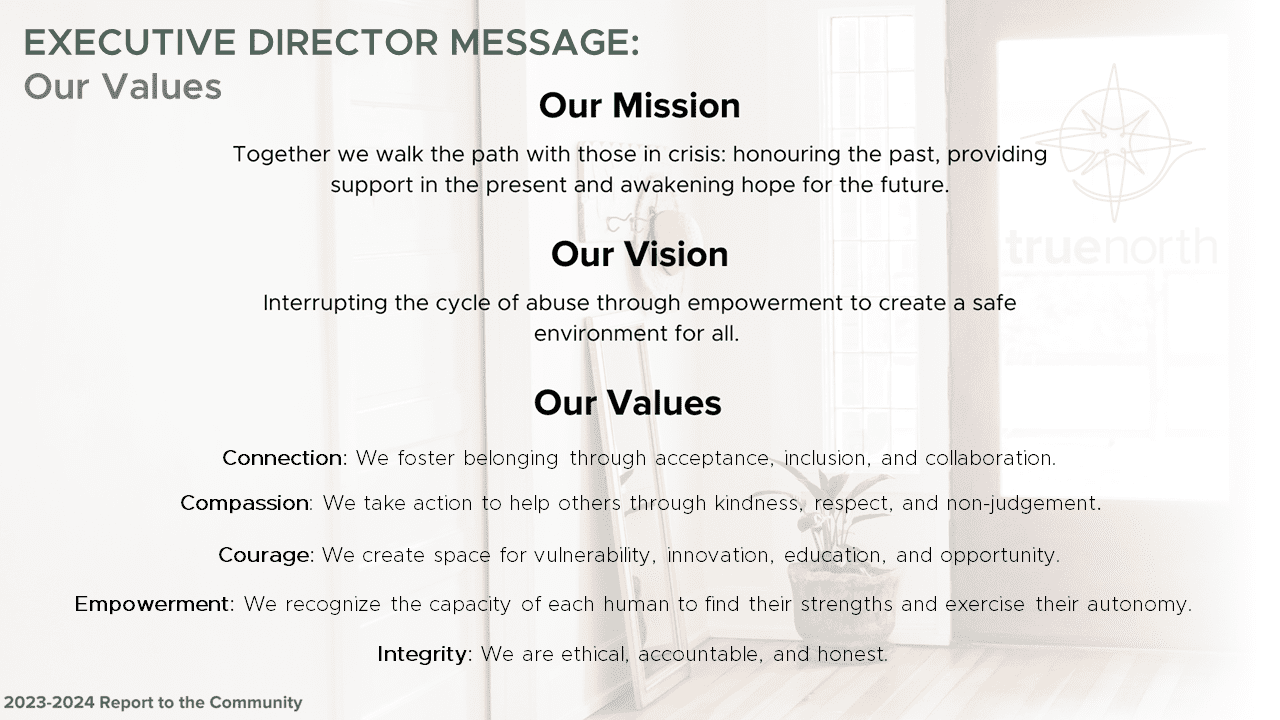
Values
Our Mission is lived every day by our team: Together we walk the path with those in crisis, honouring the past, providing support in the present and awakening hope for the future.
We continue to work towards our Vision of Interrupting the cycle of abuse, through empowerment, to create a safe environment for all.
We recently updated our organizational values, which we are pleased to present to you. These are values we live by everyday, and help us make decisions when things are hard, and remind us of why we do the work we do. Because we truly believe in the mission, vision, and values.
We look forward to seeing what we can achieve together in the future. Thank you for continued belief in us and the work we do. We truly could not do it without our partners, stakeholders and community.
Thank you.
Courtney H.
Executive Director
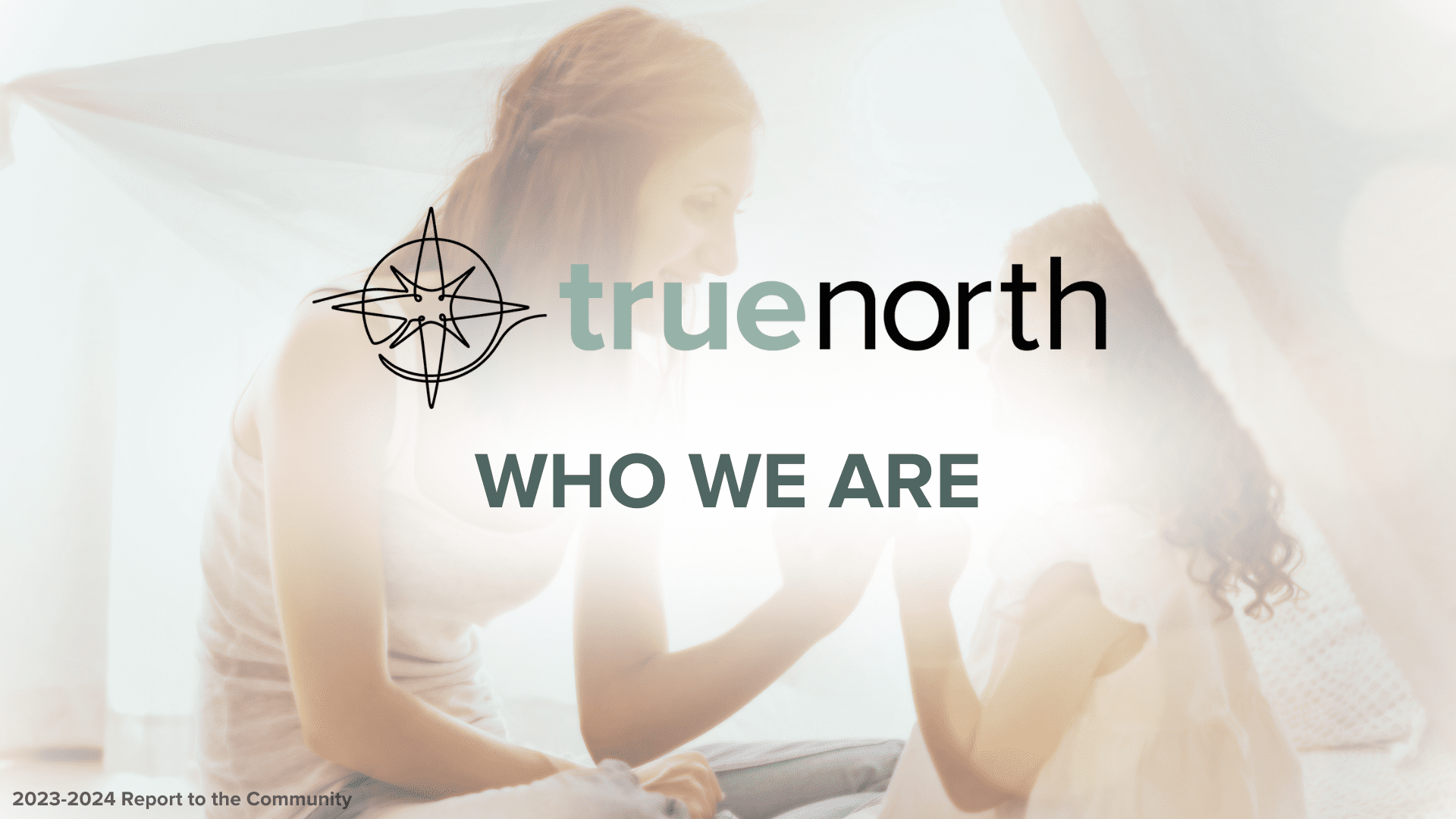
Report to the Community Introduction
Taura Fox Walker: Manager of Engagement & Partnerships
Thank you all for joining us. As our new name is still quite fresh (1 year), we recognize that we have work to do in connecting True North Society as a household name to the work of interrupting cycles of abuse in the region.
Personally, I have supported our local Women’s Shelter through Katie’s Consignment (now Serendipity’s) and Lil’ Hoots, since our family moved to the area in 2013. I met a representative from True North Society last fall and learned:
a) True North supports everyone (not just women).
b) The alarming number of children accessing the emergency shelter.
c) The shelter is one piece of the work done by True North. There is also a 24 hour help line, as well as a fulsome outreach and community education program aimed at preventing and addressing domestic abuse at all stages of the cycle.
Since joining True North as Manager of Engagement & Partnerships, I am getting to know a group of dedicated specialists. True North is determined to each do their part in walking the path with those in crisis: honouring the past, providing support in the present, and awakening hope for the future.
Moving forward, we are very focused on amplifying, and bringing awareness to, this beautiful organization’s work in the region and connecting True North Society to our community.
Your support, in the form of time, talent, and treasure, is foundational to the work that this team does for our neighbours experiencing abuse in its many forms.

Who is True North? What do we do?
Carly Cole: Manager of Programs and Client Services
While True North is primarily known as a shelter for those fleeing abuse or in crisis, we have several other programs available to those staying in the shelter and those living in the community.
Helpline
True North’s helpline is open 24/7 for anyone. Anyone in need of shelter, in distress, or concerned about family or friends, can seek support and information about what to do when someone they love is experiencing abuse.
Emergency Shelter
The shelter can support up to 25 people and is available to anyone, from any location, needing safety. Due to the shelter being able to support anyone of any gender identity, we can, and do, see folks from hundreds of kilometres away access services. Often, there is nothing in their area available to help them. True North was the first shelter in Canada to support men fleeing abuse and is still one of only 4 in the Province to do so. The shelter program operates 24 hours a day, 365 days per year.
Outreach & Public Education
Beyond the helpline and shelter, Outreach and Public Education programs are available free of charge to individuals and groups in our catchment area. To place our catchment area into perspective, our “local area” goes as far north as Trochu, as far east as Drumheller and Hussar, as far south as Milo and Mossleigh, and as far west as Chestermere. Our catchment area includes dozens of small rural communities in Wheatland and surrounding counties, all served by True North programs.


Report to the Community 2023-2024 Admissions
Guia Tinio: Team Leader
61% of clients from our in-shelter program are children ranging from the age of 1 (or younger) to 17 years old. 34% are women (mostly mothers or single individuals). The house also caters to men (fathers and singles alike). With True North being an inclusive shelter, we welcome individuals who identifies themselves as non-binary without judgement. This population comprises 1.2% of in shelter clients in the past year. The shelter gives priority to women with children seeking space both in our catchment area and beyond. The considerable number of children accessing the program highlights True North’s mandate of breaking the Cycle of Violence.
In our Outreach program, 80% who attended are women. This is significantly higher than men which is 2.5%. Children who atteended True North Outreach services is 17.5 % (ages between 5 to 17 years old).

What does “Outreach” mean?
Carly Cole: Manager of Programs and Client Services
In the simplest terms, Outreach is the services of a shelter, without actually staying in the shelter. Access to Outreach services is very low barrier. Adults experiencing abuse can call anytime to self-refer to the Outreach program.
Outreach
Outreach workers meet with clients in our building as well as in community offices. Workers provide supportive counselling, safety planning, risk assessment, referrals and help with basic needs. Outreach workers offer an empathic and supportive path to walk alongside those in need.
Many times when local people are transitioning from shelter back into the community, they will maintain a relationship with an Outreach worker anywhere from a few weeks up to a year. Some adults accessing the program have never stayed in the shelter!
Children’s Outreach
Children’s Outreach supports parents and their children who have experienced trauma with coping strategies, parenting support and safety planning.
Both programs are available free of charge to anyone experiencing abuse within the True North catchment area. For those outside the catchment area, we offer supported referrals to outreach programs in their local area.

Report to the Community 2023-2024: Yoga Program
Sophie Brochu: Counsellor & Yoga Facilitator
The True North Yoga Program offers a holistic approach to healing for our participants. It addresses the physical, emotional, and psychological impacts of domestic violence, empowering our participants to reclaim their lives and find peace within.
The True North Yoga Program is an approach to creating a safe, supportive space in which participants can learn emotional regulation skills through connection with the breath and increased body awareness. This program focuses on safety, empowers choice, and shares tools for gaining emotional and physical strength and healing. Trauma-informed yoga offers a calm environment where the participants can explore their emotions, sensations, and memories without judgement or pressure. By accessing this program, the participants experience a decrease in their trauma symptoms such as anxiety, poor sleep, and dysregulation. Yoga therapy also helps individuals function better in daily life by enabling them to transfer the techniques off the mat and utilize them to stay present and tolerate intense emotions associated with past traumatic experiences as they arise.

The Rec Room
A cornerstone of True North’s Child & Youth programming
This program is staffed by compassionate child and youth professionals and supports children and youth of all ages. Many families coming to the shelter have been in a constant state of stress and trauma. Through this programming, True North supports children to regulate, decompress, and have fun while supporting parents to reconnect with their children in a safe and calm environment. The Rec Room is staffed 7 days per week and open to families to play and enjoy daily from 8:00 am to 8:30 pm.
The space is designed to foster creativity, create calm and promote fun and connection for families!

Report to the Community: What are ACEs?
ACEs stands for “Adverse Childhood Experiences.” It originated in a groundbreaking study conducted in 1995 by the Centers for Disease Control and the Kaiser Permanente health care organization in California.
In the study, “ACEs” referred to three specific kinds of adversity children faced in the home environment—various forms of abuse, neglect, and household dysfunction.
The two main key findings of the original studies are:
- ACEs are quite common, even among a middle-class population: with over two-thirds of the population reporting at least one ACE, and nearly a quarter reporting three or more.
- The greater the number of ACEs experienced, the higher the likelihood of adverse outcomes in adulthood. Adverse outcomes such as increased risk of heart disease, diabetes, obesity, depression, substance abuse, smoking, poor academic achievement, time out of work, early death, amongst others. (Harvard University, 2024).
ACEs Statistics
- 1 in 6 adults experienced four or more types of ACEs.
- At least 5 of the top 10 leading causes of death are associated with ACEs.
- Females, younger adults, sexual minorities, and racial/ethnic minority groups were at greater risk for experiencing 4 or more ACEs. (CDC, 2024).
- Children who experienced four or more ACEs have 12x the odds of having negative health outcomes.
- People who have experienced any single category of ACEs are 87% more likely to have experienced other forms of trauma. (Advokids, 2024).
- People with 6 or more ACEs are at risk of dying 20 years earlier than those who have no ACEs
- People who experience four or more ACEs have:
-
- 3x the levels of lung disease and smoking.
- 11x the level of intravenous drug abuse.
- 14x the number of suicide attempts.
- 4x as likely to have begun intercourse by age 15.
- 5x more likely to develop depression.
- 2x the level of liver disease. (SFCCC, 2019).
-
ACEs & Intimate Partner Violence
A Meta-analysis of 27 studies with 65,330 participants examined the association between ACEs and IPV perpetration and IPV victimization (Zhu et al., 2024).
-
- The results of the meta-analyses demonstrated that ACEs were positively associated with IPV perpetration and victimization.
- ACEs had a cumulative effect on IPV, where each additional ACE increased the odds of engaging in IPV by 51%.
- Higher ACEs scores, referring to abuse, neglect, and household dysfunction experienced prior to the age of 18, were associated with greater IPV perpetration.
- The observation or experience of violent incidents during childhood is believed to contribute to the transmission of violence across generations by either imitating or tolerating similar behaviors in adult relationships.
ACES & Childhood
-
- Parent-child attachment could influence this, as abuse by a caregiver towards the child or the child’s attachment figure can affect the child’s feeling of safety and stability. When a child feels threatened in terms of safety and stability, they might perceive the world as hostile and adapt by displaying more aggressive behaviors towards others.
- Violence experienced in childhood can trigger physiological changes that contribute to later violent behavior. Repeated stress exposure can disrupt neurological development and impair stress responses, coping mechanisms, and emotional regulation. This cascade increases the likelihood of engaging in violent behavior. (Zhu et al., 2024).

Preventing ACEs
Preventing ACEs could:
-
- Reduce the number of adults with depression by as much as 44%.
- Reduce up to 21 million cases of depression.
- Reduce up to 1.9 million cases of heart disease.
- Reduce up to 2.5 million cases of obesity.
- Reduce smoking by 33% and heavy drinking by 24%.
- Reduce unemployment by 15%.
- Reduce Chronic Obstructive Pulmonary Disease by 27% and asthma by 24%. (CDC, 2024)
Targeting ACEs with Protective Factors
Carly Cole: Manager of Programs and Client Services
This can seem like a lot of doom and gloom. And rightfully so. But I am happy to report there is good news here. Yes, ACEs correlate with high-risk behaviours and negative health outcomes. But what I can also tell you is that there has been significant research done about protective factors for these children.
A PCE or positive childhood experience is the opposite of an ACE. The more of these positive experiences that a child has, the higher the potential for them to avoid toxic stress and create neurological pathways that can support them to have opportunities for healthier outcomes. The more PCEs, the higher the likelihood for the child to build resiliency to promote positive adulthood outcomes. PCEs can include access to just one stable adult with whom they have a consistent, healthy and supportive relationship.
What True North aims to do with our services across our organization is work with parents to help them understand ACES’s impact and how PCEs can aid in offsetting this. Parents are taught the tools and children are provided access to PCEs such as a stable, safe and calm environment, outings to the park, pool, zoo and more.
What happened to us does not need to define us. True North aims to provide early intervention in our mission to end the cycle for the families we serve.
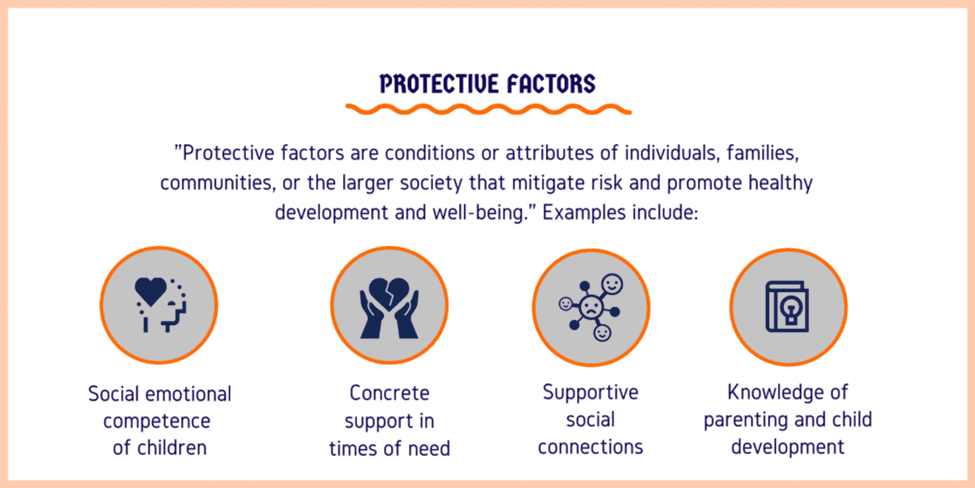

Family Enjoyment Program
Joni Chyzyk: Administrative Manager
True North’s Family Enjoyment program allows True North to offer parents and children in-shelter opportunities to create new, positive family experiences free from violence.
Family Enjoyment creates the opportunity for fun and family bonding. Family outings include trips to the Calgary Zoo, Heritage Park, Tyrell Museum and the Science Center. True North also organizes events in-shelter for families to enjoy, like evenings filled with popcorn, candy, and sundaes for movie nights, game nights, birthday celebrations and special holidays.
Families in shelters work hard to accomplish moving forward to their next chapter. The Family Enjoyment program helps us give families that special bonding time in a very fun creative way!
The Home Library
Amanda Vanderlaan: Public Educator & Community Engagement
The Home Library is a special place in the living area of the emergency shelter where families are free to borrow books. Books in the Home Library are filled with stories of courage, adventure, determination, and triumph.
We ensure none of the books in the library depict any type of interpersonal violence, assault, or drug use. While clients stay with us, they are already doing a lot of emotional labour and personal growth. We want the home library to be a place of escapism and peace that
-
- encourages healthy family bonding practices through reading together.
- helps reduce feelings of stress and anxiety through solo reading.
- encourages brain development and a love of reading.
- reflects our values of inclusivity & diversity by housing stories from a variety of cultures.
- and gives clients a greater feeling of normalcy and autonomy during their transition period with us.
Trauma Informed
We understand that leaving an abusive home is scary and staying in shelter can feel isolating. It is our hope that the Home Library helps bring families a little more comfort and enjoyment while we help to support them as they plan for the future.

True North: Public Education
Amanda Vanderlaan: Public Educator & Community Engagement
The Public Education program is a preventive and intervention program that is designed to reach out into the community to achieve 3 main goals.
- Targeting root causes for the later development of violence by educating & supporting elements of healthy relationships such as communication skills, consent, empathy, and respect.
- Creating awareness about different types of relationship violence, the cycle of violence, and how unhealthy behaviours can slowly escalate over time.
- Creating awareness of who True North is, how we help our community, and the resources available to those experiencing violence.
There are a few ways the Public Education accomplishes these goals.
Awareness Campaigns
- We facilitate awareness campaigns throughout the year. For example, we connect directly with our community throughout Family Violence Prevention Month in November through events like the Purple Ribbon Campaign. In May, Mental Health Awareness Month, we facilitated a social media campaign that helps to support mental wellness.
Teamwork
- Teamwork: we support other service providers with whom we share goals (such as the Wheatland Youth Network, Trellis & Family Community Support Services). Some current events we’ve had the opportunity to support have included Teen Leadership, Affirmation Bracelet Making, and a Social Media & Self Esteem Workshop. Program collaboration is a valuable tool when we are working towards violence prevention. These types of events give us a unique opportunity to informally connect with and support youth, create a safe space to ask questions about healthy relationships & abuse, and they’re a lot of fun!
Workshops & Presentations
- We also host workshops for schools, clubs, and organizations. Our most popular topics for schools are 1) the elements of healthy relationships, 2) recognizing abuse, and 3) the bystander effect. After a workshop, participants are asked to complete a voluntary survey to help us examine if we are reaching our programming goals. We’ve found the majority of students choose to fill out the survey which gives us some great data seen in the slide above.

Report to the Community 2023-2024: Transitioning
Guia Tinio: Team Leader
Our in-shelter clients stay an average of 24 days. In response to the lack of affordable housing within the area, True North has extended the number of days stay from 21 to 30 days, giving a bit more time for clients to secure safe transitional space.
52% of our in-house clients have moved into to either another shelter, couch surfing, or have joined family and friends whereas only 25 % are able to find stable housing. Stable housing ranges from rental units, subsidized housing, or shared accommodation. The remaining 18% goes to Transitional Housing or Second Stage Housing. It is worth noting that Second Stage Housing has extremely long wait list.
Danger Assessments
At True North, we conduct Danger Assessments for clients fleeing Intimate Partner Violence. We have completed 41% assessments in the past year. 85% of our clients were discharged from the shelter program with a Safety Plan in place making them more equipped as they transition. The remaining 15% are either individuals who decline to do the safety plan or people who feels safe transitioning and prefer not to do it.
This service is offered to everyone accessing shelter programs and is reviewed accordingly.
Report to the Community: Other News from This Year


For over 30 years, True North Society has worked to walk the path with those in crisis: honouring the past, providing support in the present, and awakening hope for the future. This work has been recognized by community, locally and internationally:
In January of 2023 the Strathmore Wheatland Chamber of Commerce (SWCC) awarded True North Society (then Wheatland Crisis Society) Non-Profit of the Year as nominated and voted by community!
More recently, True North Society won a Purple Ribbon Award in the category of Outstanding Local Organization! “The international Purple Ribbon Awards program honors the countless heroes of the domestic violence movement, including advocates, programs, shelters, survivors and members of the community support system.”
These two awards highlight external recognition from our regional community and international industry specialists that True North is a dedicated and compassionate group of over 30 individuals committed to helping rebuild lives affected by abuse and domestic violence.


Support the True North Society
-
- Share your artistic talents by making knit and crochet items for our shelter guests to wear – nothing hits the heart like a useful gift made with love!
- We are seeking sponsor(s) to continue the Family Enjoyment Program!
- Host a community fundraising event to the benefit of True North.
- True North keeps a wish list of the most in need donation items that is updated quarterly on our website: diapers, personal care items, cellphones and cell chargers seem to be a constant need.
- Consider serving as a Trustee on our Board of Directors!
- Join our Fundraising Committee!
- Of immeasurable value: become an advocate. Share what you know about supports available through True North Society with your neighbours, friends and family, liberally.
As Brene Brown says: “Shame cannot survive being spoken. It craves secrecy, silence and judgement.”
Help connect those in need. We greatly value your time, talent, and treasure.


Thank you for your intertest in True North’s Report to the Community 2023-2024!
Learn More about how True North is responding to the changing landscape of domestic violence in our communities:
Report to the Community 2023-2024 Data Sources & References
ACEs Too High (2024). 3 Realms of ACEs. https://acestoohigh.com/aces-101/.
Advokids (2024). What impact do ACEs have? https://advokids.org/adverse-childhood-experience-study-aces/.
Centers for Disease Control and Prevention (2024). Adverse childhood experiences – Prevention early trauma to improve adult health. https://www.cdc.gov/vitalsigns/aces/index.html
Centre on Child Wellbeing & Trauma (2024). How to counter adverse childhood experiences and lifelong consequence of trauama. https://childwellbeingandtrauma.org
Center on the Developing Child, Harvard University (2024). ACEs and toxic stress. https://developingchild.harvard.edu/resources/aces-and-toxic-stress-frequently-asked-questions/
Morton, S., Curran, M., & Barry O’Gorman, M. (2022). Adverse childhood experiences, domestic violence and substance misuse: An action research study on routine enquiry and practice responses. Frontiers in psychiatry, 13, 892849. https://doi.org/10.3389/fpsyt.2022.892849
San Francisco Community Clinic Consortium (SFCCC), (2019). Adverse childhood experiences. https://www.sfccc.org/blog/2019/11/13/adverse-childhood-experiences.
Zhu, J., Exner-Cortens, D., Dobson, K., Wells, L., Noel, M., & Madigan, S. (2024). Adverse childhood experiences and intimate partner violence: A meta-analysis. Development and Psychopathology, 36(2), 929–943. doi:10.1017/S0954579423000196.
